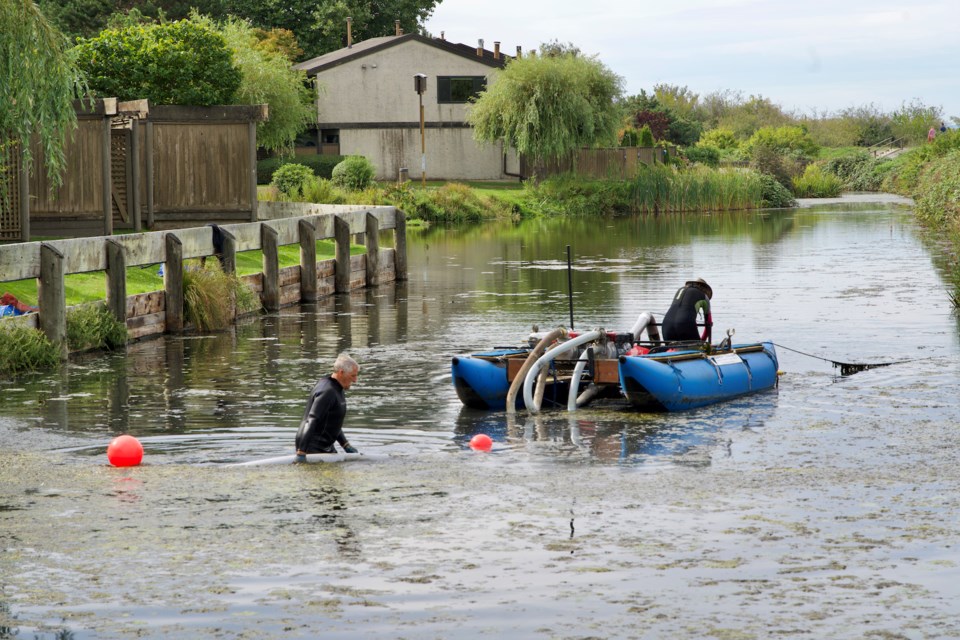Invasive species – including a large infestation that likely came from someone’s aquarium – are posing risks to Richmond ecosystem and infrastructure, with the city putting $725,000 over the past three years towards managing them.
The City of Richmond is now considering putting pressure on the provincial and federal governments to “limit the introduction” of invasive species into local ecosystems, which could also help reduce the cost to municipalities.
In a report to the public works and transportation committee, city staff are recommending that letters be sent to those governments, asking for a “wholesome review” of current policies that allow for the importation and sale of invasive species, and to improve those policies as necessary.
The item will be discussed at Tuesday’s committee meeting.
“When it comes to bringing things in, that’s outside of Richmond’s jurisdiction. So, I think it is valuable that we write (the letter) to expose the problems that we’re seeing,” Coun. Michael Wolfe told the Richmond News.
“We’re in a region that receives a lot of shipping by boat, by air, by truck from across the border or other jurisdictions, ending up here to get packaged, processed, shipped elsewhere. So we seem to be a hotspot for invasive species and getting the other two levels of government to do their part in tightening ways that things can get moved, I think is valuable.”
He noted that Richmond’s unique bog ecology can “very easily be taken over by the rapid growth and smothering” from invasive species.
According to the report, B.C’s Weed Control Act and the federal Plant Protection Act are “related to the distribution and retail of invasive species, such as Brazilian elodea, that pose a threat to Richmond if released.”
Wolfe added he may also suggest adding to the item at Tuesday's committee meeting, to have the city also request support from the Union of BC Municipalities, as that may help get the province to act.
Cities should also be working together to combat invasive species, he said.
There are more than a dozen invasive species in Richmond, according to the report, all of which can cause ecological impacts, but eight are of more concern than others as they can cause further impacts to health and/or infrastructure.
Of those eight “priority species” identified in Richmond’s invasive species management plan, two – Parrot’s feather and Brazilian elodea – are “readily available for purchase through aquarium supply stores,” according to the city staff report.
Meanwhile, a provincial fact sheet on Brazilian elodea states it is commonly sold under the alias of Anacharsis spp., and is “thought to be the most universally available aquarium plant on the market.”
Richmond has been dealing with a large infestation of Brazilian elodea near the West Dyke since 2014 – believed to have come from an aquarium owner who dumped the contents of their tank in the watercourse, city spokesperson Clay Adams told the News last month.
The plant has an “aggressive” ability to rapidly reproduce, and can form a dense mat canopy that shades out other plants, Adams said at the time. It can also clog rivers and drainage canals, increasing the need for maintenance.
From 2018 to 2021, about $725,000 was secured through Richmond’s capital and operating budgets for the inventory and management of priority species threatening city infrastructure, according to the staff report. Part of this was offset when the city received $225,000 from the province for the management of Brazilian elodea.
The report notes that funding for invasive species initiatives is secured through annual budgets but any further funding needs will be brought to council for consideration in the future, as needed.
But Wolfe said he thinks the city should also be considering options for next year’s budget, such as staffing allocation for helping to map out and target the more problematic areas requiring city response, and will likely also raise this at the committee meeting.
“Many of these that I’m talking about are our public lands that are in our city parks that need Himalayan blackberry control or invasive periwinkle or English ivy. If we’re not tackling these invasive species that are in our natural areas like the middle of the Nature Park, they are only spreading,” he said.
“I think with a little bit of fine-tuning, we can make this report, this action, even stronger.”
Also to be discussed, as part of the report, is Richmond's Enhanced Pesticide Management Program, which provides, for example, outreach and education about the effects of pesticides and potential alternatives. An initiative under this program includes the city's ongoing work to manage Brazilian elodea.



